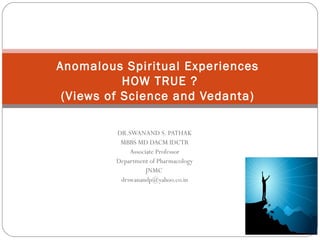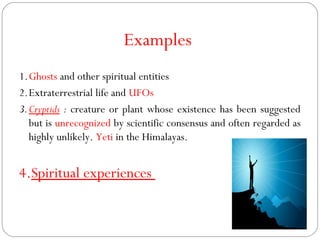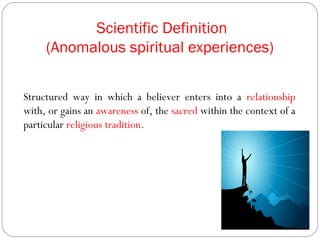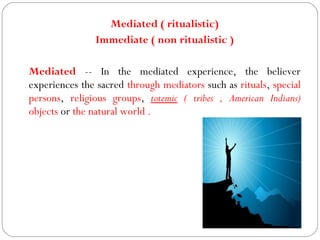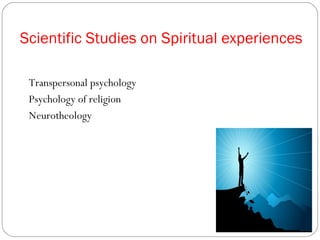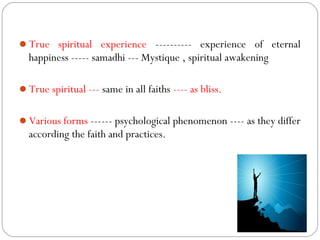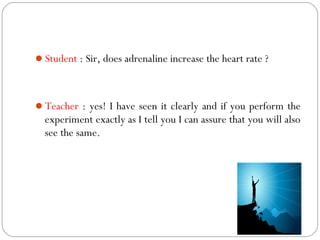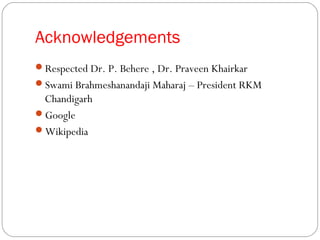Spiritual experiences
- 1. Anomalous Spiritual Experiences HOW TRUE ? (Views of Science and Vedanta) DR.SWANAND S. PATHAK MBBS MD DACM IDCTR Associate Professor Department of Pharmacology JNMC drswanandp@yahoo.co.in
- 2. What is Anomalous experience ? What are the various spiritual Anomalous experiences ? Scientific views and explanation. Anomalous Spiritual experience in the light of Vedanta philosophy. Answer to the question HOW TRUE ?
- 3. Anomalous :Common meanings Anomalos – Latin – uneven – deviating from usual order Unusual Super natural Paranormal
- 4. Examples 1.Ghosts and other spiritual entities 2.Extraterrestrial life and UFOs 3. Cryptids : creature or plant whose existence has been suggested but is unrecognized by scientific consensus and often regarded as highly unlikely. Yeti in the Himalayas. 4.Spiritual experiences
- 5. Scientific Definition (Anomalous spiritual experiences) Structured way in which a believer enters into a relationship with, or gains an awareness of, the sacred within the context of a particular religious tradition.
- 6. Types of Spiritual Experiences Transient - the experience is temporary; the individual soon returns to a "normal" frame of mind. Ineffable - the experience cannot be adequately put into words.
- 7. Noetic -- the individual feels that he or she has learned something valuable from the experience. Passive -- the experience happens to the individual, largely without conscious control. Mixed– combination
- 8. Mediated ( ritualistic) Immediate ( non ritualistic ) Mediated -- In the mediated experience, the believer experiences the sacred through mediators such as rituals, special persons, religious groups, totemic ( tribes , American Indians) objects or the natural world .
- 9. Immediate -- The immediate experience comes to the believer without any intervening agency or mediator. The deity or divine is experienced directly
- 10. Spiritual Experiences : Nature 1. Ecstasy 2. Enthusiasm 3. Mystical 4. Spiritual awakening
- 11. Ecstasy In ecstasy the believer is understood to have a soul or spirit which can leave the body. In ecstasy the focus is on the soul leaving the body and to experience transcendental (divine ) realities.
- 12. Enthusiasm or Possession God is understood to be outside, other than or beyond the believer. A sacred power, being or will enters the body or mind of an individual and possesses it. A person capable of being possessed is sometimes called a medium. The deity, spirit or power uses such a person to communicate to the immanent world.
- 14. Spiritual Awakening A spiritual awakening is a Religious experience involving a realization or opening to a sacred dimension of reality. Often a spiritual awakening has lasting effects upon one's life.
- 15. ? Causes Spiritual Experience Meditation Praying Music Dance such as: Sufi whirling Extended exercise, often running in a large communal circle, which is used in various tribals. Extreme pain
- 16. Profound sexual activity Use of Entheogen (psychoactives)such as: Opium Cannabis Mushrooms Ethanol Psychological or neurophysiological anomalies, such as: Profound depression or schizophrenia Temporal lobe epilepsy Stroke Near-death experience
- 17. Scientific Studies on Spiritual experiences Transpersonal psychology Psychology of religion Neurotheology
- 18. Transpersonal psychology School of psychology that studies the transpersonal, self- transcendent or spiritual aspects of the human experience. It is- "the study of humanity’s highest potential, and with the recognition, understanding, and realization of unitive, spiritual, and transcendent states of consciousness"
- 19. It distinguishes between institutional religion and personal religion. Institutional religion: refers to the religious group or organization, and plays an important part in a society's culture. Personal religion: in which the individual has mystical experience, can be experienced regardless of the culture.
- 20. Psychology of religion Psychology of religion is the psychological study of religious experiences, beliefs, and activities.
- 21. Neurotheology Neurotheology, also known as biotheology or spiritual neuroscience, is the study of correlations of neural phenomena with subjective experiences of spirituality and hypotheses to explain these phenomena. Proponents of neurotheology claim that there is a neurological and evolutionary basis for subjective experiences traditionally categorized as spiritual or religious.
- 22. According to the neurotheologist Andrew B. Newberg, neurological processes which are driven by the repetitive, rhythmic stimulation which is typical of human ritual, and which contribute to the delivery of transcendental feelings of connection to a universal unity. For this to occur they say there must be a blending of the rhythmic stimulation with ideas.
- 23. Studies of the brain and religious experience Early studies in the 1950s and 1960s attempted to use EEGs to study brain wave patterns correlated with "spiritual" states. During the 1980s Dr. Michael Persinger stimulated the temporal lobes of human subjects with a weak magnetic field. His subjects claimed to have a sensation of "an ethereal presence in the room.". Some current studies use neuroimaging to localize brain regions active, or differentially active, during religious experiences.
- 24. What Science does? Defines and classifies spiritual experience in a systematic manner Utilizes the existing knowledge in medicine and psychology to explain the occurrence of spiritual experience Tell us regarding the management
- 25. Conclusion (nature/ existence) Inconclusive !
- 26. Vedanta Philosophy and Spiritual Experience Why Vedanta philosophy ? It is the last part of vedas which speak about knowledge Not by a particular personality but group of scholars One of the most scientific and bold religious views
- 27. DEFINITION AS PER VEDANTA Anomalous …Supernatural …intense natural Spiritual experience ----- experience of spirit ( Atman/ Brahman) Theory is based on one common observation and one hypothesis
- 28. Observation Ananda or bliss has no alternative
- 29. Hypothesis Any substance break down further infinitely BRAHMAN ULTIMATE REALITY BASIC NATURE
- 30. QUALITIES OF BRAHMAN ( reality) SAT ----- TRUE CHIT ----- PERMANAT ANANDA ------ BLISS This reality not perceived always as we are bound by our senses --- the spell of Maya
- 31. Science “We are human beings having spiritual experience” Vedanta “We are basically spiritual beings having human experience under the spell of Maya”
- 33. Supernatural – perfectly natural phenomenon – a bit we all experience in the form of --- Happiness Desire ------- complete------ for fraction of sec till another desire arises in mind ----- BRAHMAN which is inside ---- Happiness
- 35. True spiritual experience ---------- experience of eternal happiness ----- samadhi --- Mystique , spiritual awakening True spiritual --- same in all faiths ---- as bliss. Various forms ------ psychological phenomenon ---- as they differ according the faith and practices.
- 36. Journey towards supernatural can be enhanced by Purity of mind --- control of desires Association with holy men Raj yoga Karma yoga Gyan yoga Bhakti yoga
- 37. Verification of true spiritual experience Should not be under the influence of intoxicants Repeated again and again Compare it with the experiences of the holy men Compare with the true scriptures … Upanishads and Brahmasutras
- 38. Make a drastic positive permanent change in person The process of verification is long, tedious and based on rejecting the null hypothesis.( Neti neti vichar) Can be experienced by other person if he follows the same path.
- 39. What Vedanta does? Defines what is spiritual experience and provides explanation for its accourance. Tells us how to differentiate between the true spiritual experience and pathological state of mind --- but does not tell us how to deal with this pathological state Meeting point of orthodox religion and science towards the path of truth
- 40. Student : Sir, does adrenaline increase the heart rate ? Teacher : yes! I have seen it clearly and if you perform the experiment exactly as I tell you I can assure that you will also see the same.
- 41. Narendranath Dutta : Sir, have you seen God ? Shri Ramkrishna : Yes , and more clearly than I see you now, if you do exactly as I say I can assure you that you will also be able to see God.
- 42. Anomalous spiritual experiences HOW TRUE ? Spiritual experiences are both true and false ( anomaly ) The entity of true anomalous spiritual experience exists and it should be respected It should be differentiated from the other experiences with verification criteria. The false spiritual experiences needs counseling and treatment. We must combine Psychiatry , Psychology and Vedanta
- 43. Acknowledgements Respected Dr. P. Behere , Dr. Praveen Khairkar Swami Brahmeshanandaji Maharaj – President RKM Chandigarh Google Wikipedia
- 44. Thank you ….
- 45. CME ON SCIENCE AND SPIRITUALITY : JNMC :SAWANGI
